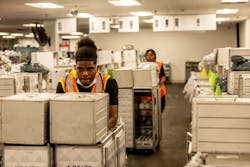Commissary Service: Understanding the What and How
Unifi Aviation provides commissary service for Delta Air Lines at its busiest hub – Hartsfield-Jackson Atlanta International Airport (ATL). Commissary employees load and prepare the service carts and transport and load them on the flight.
All the meals – including crew meals – arrive pre-packaged from a catering facility.
“We double-check to ensure that the packaging is intact before loading it into the cart. Two to three agents do quality control every shift. Most of our food has a long shelf life, such as snacks, beverages, etc.; perishable meals are packaged in dry ice,” says Jerrod Green, the director of operations who oversees Unifi’s Commissary Operations at ATL.
Depending on the aircraft size, each flight has an average of four to eight carts.
“We have documentation for every flight on the service required, and the staff will build that out using the right cart - the right size. Everything the flight attendant needs for service, from meals down to coffee stirrers, is built out by our team,” says Green.
“Once the carts are ready, they are loaded onto our trucks. The drivers have PDA devices that tell them which carts go to which flight based on departure time. The driver will go to the flight – exchange the old product with the new product, and once they are done with all the flights, those old carts are brought back to our warehouse to be emptied and restocked for the next set of flights.”
In total, Unifi Aviation has just over 475 employees total on its commissary service for Delta Air Lines in Atlanta. The trucks they use are 14-foot and 16-foot and have one and two drivers, respectively. Ramp agents guide Unifi drivers to the aircraft and sometimes help load the carts onto the aircraft, depending on how much time the drivers have.
“The smaller flights are what we call walk-ups, where the drivers must walk the carts in, and the more extensive flights, we rise up,” Green said, adding the smaller flights take longer to load -- about 18 minutes versus 12.
On average, every flight has four to six crew meals, about 40 8-ounce waters and a couple 1.5L water bottles, one to two dozen cans of soda and juices, and about 200 individually packaged snacks. Daily, about three flights require crew meals and first-class passenger meals.
Commissary training takes approximately six weeks. Employees are trained on where carts go and how they fit dock training for loading and unloading, and driver’s training.
“We emphasize continuous training for our drivers, and our partnership with Delta is crucial to on-time departures. For example, if there are challenging gates for our drivers to get in and out of, we work on the right solutions. But everything rests on safety, and that is the number one priority,” Green says.
About the Author
Rebecca Kanable
Assistant Editor
Rebecca Kanable, a veteran journalist, worked with Endeavor Business Media's aviation group from 2021 to 2024 as assistant editor of Airport Business, AMT and Ground Support Worldwide. She previously worked for various publications, including trade magazines and newspapers.

